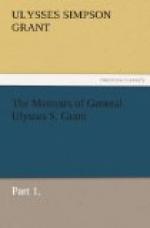The presence of United States troops on the edge of the disputed territory furthest from the Mexican settlements, was not sufficient to provoke hostilities. We were sent to provoke a fight, but it was essential that Mexico should commence it. It was very doubtful whether Congress would declare war; but if Mexico should attack our troops, the Executive could announce, “Whereas, war exists by the acts of, etc.,” and prosecute the contest with vigor. Once initiated there were but few public men who would have the courage to oppose it. Experience proves that the man who obstructs a war in which his nation is engaged, no matter whether right or wrong, occupies no enviable place in life or history. Better for him, individually, to advocate “war, pestilence, and famine,” than to act as obstructionist to a war already begun. The history of the defeated rebel will be honorable hereafter, compared with that of the Northern man who aided him by conspiring against his government while protected by it. The most favorable posthumous history the stay-at-home traitor can hope for is—oblivion.
Mexico showing no willingness to come to the Nueces to drive the invaders from her soil, it became necessary for the “invaders” to approach to within a convenient distance to be struck. Accordingly, preparations were begun for moving the army to the Rio Grande, to a point near Matamoras. It was desirable to occupy a position near the largest centre of population possible to reach, without absolutely invading territory to which we set up no claim whatever.
The distance from Corpus Christi to Matamoras is about one hundred and fifty miles. The country does not abound in fresh water, and the length of the marches had to be regulated by the distance between water supplies. Besides the streams, there were occasional pools, filled during the rainy season, some probably made by the traders, who travelled constantly between Corpus Christi and the Rio Grande, and some by the buffalo. There was not at that time a single habitation, cultivated field, or herd of domestic animals, between Corpus Christi and Matamoras. It was necessary, therefore, to have a wagon train sufficiently large to transport the camp and garrison equipage, officers’ baggage, rations for the army, and part rations of grain for the artillery horses and all the animals taken from the north, where they had been accustomed to having their forage furnished them. The army was but indifferently supplied with transportation. Wagons and harness could easily be supplied from the north but mules and horses could not so readily be brought. The American traders and Mexican smugglers came to the relief. Contracts were made for mules at from eight to eleven dollars each. The smugglers furnished the animals, and took their pay in goods of the description before mentioned. I doubt whether the Mexicans received in value from the traders five dollars per head for the animals they furnished, and still more, whether they paid anything but their own time in procuring them. Such is trade; such is war. The government paid in hard cash to the contractor the stipulated price.




